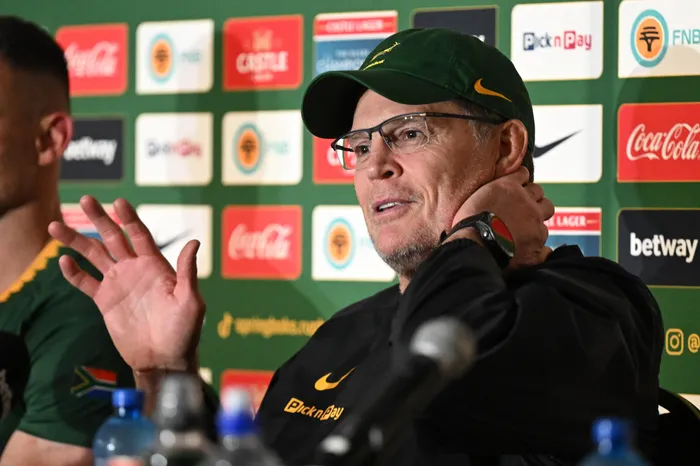Erasmus and Co will admit Springboks must sharpen up for Eden Park
COMMENT: The Rugby Championship

Springbok coach Rassie Erasmus says his team must raise their game to beat the All Blacks at Eden Park after a stern test against Australia. Photo: Henk Kruger Independent Media
Image: Henk Kruger Independent Media
Rassie Erasmus gave his team seven out of 10 after they beat the Wallabies in Cape Town, but in the confines of the team room in Auckland, he might drop that down to a five relative to what will be required to beat the All Blacks at Eden Park.
“Sometimes you just have to get back on the horse,” Erasmus said, after the Cape Town game. But now that they are in the saddle, the Boks must be far better to beat the All Blacks in New Zealand.
Maybe it is not a bad thing that the Boks have been “kept honest”, a phrase used in New Zealand, and they travelled to the Land of the Long Black Cloud on Tuesday night having been given a reality check by the impressive Wallabies.
Before Joe Schmidt’s team arrived in South Africa, how many pundits would have predicted that the Wallabies would take home five Rugby Championship points to the four of South Africa, and that the men in yellow would outscore the Springboks nine tries to three?
It has been a mixed bag from a Springbok team that, over the two matches, looked disjointed. That is no surprise given that over the course of the Incoming Series and the two matches against Australia, there was an average of 10 changes to the starting line-up and 14 changes to the match 23 across six matches.
We understand why.
The main goal will always be winning the World Cup for the third successive time, and that requires Erasmus to take a squad of seasoned players to Australia in two years. He also knows he must keep blooding younger players because a fair number of his Old Guard will not make it.
Erasmus continues to play the veterans because he sees the advantage of keeping them in the picture if they remain the best in their positions, even though several will fall away before 2027. He wants them to help the team continue winning while teaching the newcomers the ropes.
But building depth comes at a cost, and we saw it in the lack of cohesion against a Wallabies team that was the opposite. They came to South Africa in the groove after three fiercely contested Tests against the British and Irish Lions. Injury-permitting, Schmidt picked the same squad each week.
The rugby world got the answer as to which side was more battle-hardened in Johannesburg and Cape Town. The Aussies had been at war and hit the ground running at Ellis Park, despite being swept off their feet in an opening quarter that Schmidt described as “the best window of rugby I have ever seen from the Springboks.”
The loss in Joburg forced pragmatism from the Boks in Cape Town, where they kicked 35 times, almost twice as much as in Johannesburg. Most of the kicking was done by Handré Pollard, who has quietly stepped in from the background to state his case as the man to take the Boks to the next World Cup.
Pollard turned 31 in March and will be 33 at the next World Cup, an age when many modern fly-halves are in their prime.
Schmidt made an interesting observation after his team lost to the Springboks last week: “I think Rassie will be concerned that there were half a dozen line-breaks from us in this match (and a heap more in Johannesburg).”
If the Wallabies can carve up the Bok defence, so can the All Blacks. But the comfort is that Erasmus and his Boks know where they stand and what to do after two “proper” Test matches following the lukewarm fare of June and July.
Join us over at THE CLUTCH
For the latest breaking sporting news and insights from our veteran sports journalists visit our YouTube channel @theclutchza
Related Topics: